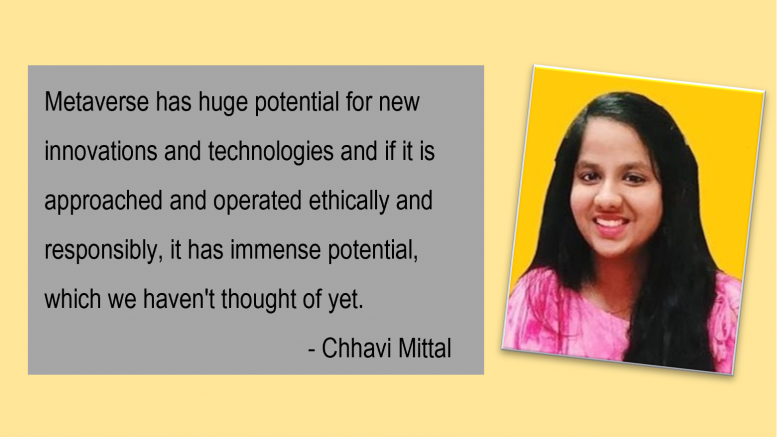We are living in times when digital alternatives to real world activities like shopping, games, meeting, and socialising have started to become a part of conversation. This digital space, the Metaverse, is an immersive and interactive network of 3D virtual worlds, which is focused on replicating the real world into a completely virtual form. Real life activities can now be done in the metaverse by putting on the headset, which will take us to the virtual world. Metaverse has gained immense attention ever since Mark Zuckerberg rebranded Facebook as Meta, solidifying metaverse as the future of the Internet. He also estimates that it could take up to five to ten years to become mainstream.
Going back to the 1992 novel of Neal Stephenson, we find the word “metaverse”, which was coined by him, to describe a virtual world, in his imagined future which reflects a 21st-century dystopia and, now every organisation, brand and company is in the race to establish their own space in the Metaverse and some of them have already started competing. That being said, the metaverse is still at a very nascent stage of development and will take a fair amount of time to come into play. Remote working, digital identity, and decentralised government are considered as potential benefits of the metaverse.
Now, let’s try to get a deeper knowledge of what the metaverse actually is. Metaverse is an amalgamation of several technologies working in tandem like Artificial Intelligence (AI), Augmented Reality (AR), Virtual Reality (VR), 3D reconstruction, brain-computer Interface (BCI), Internet of Things (IoT), Blockchain Technology, Web 3.0, Edge Computing and Internet Infrastructure. Some of these technologies are still in development and yet to overcome several challenges related to real-world implementation because operating in the metaverse will require extremely high-speed internet, high bandwidth, and very low latency in order to provide a virtual world with highly detailed textures and a rich user interface. It will be an independent virtual economy, which will have digital currencies and Non Fungible Tokens (NFTs). The businesses are viewing metaverse as a great opportunity which will help them expand their business and that’s why many of them are creating their own versions of the metaverse. Tech giants like Meta (Formerly Facebook), Microsoft, Apple, Nvidia, and Google are investing a heavy amount of money in the metaverse. Entrepreneurs will have a better chance of higher engagement with their stakeholders, collaboration, and connection can be established at a greater value with the help of 3D avatars. According to JP Morgan, the metaverse offers a $1 trillion market that will “infiltrate every sector in some way in the coming years.” Sectors like real estate, banking, retail and IT have a substantial scope of opportunities in the metaverse. Some of the Indian giants and IT industry players like TCS, Infosys, Tech Mahindra, Tanishq, MakeMy Trip, and several others have already hopped on the metaverse bandwagon.
Now, the question arises as to why brands are rushing to the metaverse? It’s not been a long time since metaverse has gained attention worldwide, but brands and companies have already started experimenting with it. There are many reasons for it, especially in a space that provides a seamless experience and limitless options for doing activities, brands do not want to miss out on any opportunity by not keeping up with the latest technological advancements. Also, they want to leverage the first-mover advantage, because it is going to be the future of business, marketing, and the internet, after all. GenZ and millennials being the second most important factor, they are the ones who are tech-savvy and avid consumers of metaverse-like platforms such as Roblox, Pokemon GO, etc.
Undeniably, the metaverse has a wide spectrum of opportunities in front of it, but at the same time, there are many challenges as well. The most important of them are reputation and identity theft. There is a need to ensure that fakes and bots do not run rampant in the metaverse. Issues like data theft and security are few of the ever-present concerns when it comes to the internet like the regulation of currency and payments systems, law and jurisdiction, ownership of property for the real estate industry, etc. Many people are still unsure if the metaverse has the potential to take over the real world, if it will have a negative effect on their personal lives. But, these technologies are meant to expand our reach and experience across the internet, allowing us to have experiences which we couldn’t have had previously.
Metaverse has huge potential for new innovations and technologies and if it is approached and operated ethically and responsibly, it has immense potential, which we haven’t thought of yet. While this concept is still in its developmental stage, it will be interesting to see what the future holds for the metaverse and only then we will be able to have a clearer understanding of the challenges and opportunities that comes with this revolutionary technology.
The views and opinions published here belong to the author and do not necessarily reflect the views and opinions of the publisher.



Very informative.